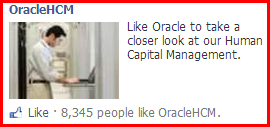A while back I started collecting examples of business-speak that I found alarming. Some simply seemed to set out to confuse. Others were intended to make the speaker seem clever – usually for their own benefit. But the worst examples were ones where the term indicated an absence of care and concern for the people in an organisation. Worse still would be ones that not only threatened an absence of care but potentially the abuse of people.
A month ago, I was invited to apply for an amazing job in Oxford. It was a real honour and the job was fascinating with considerable potential. It was all about helping an organisation, unused to doing so, to provide visionary leadership to its staff. Sadly, they chose someone else after all, but in preparing for the interview I began to do some research using Google. I don’t pretend to understand how these things work, but, within a few hours, I was receiving Facebook adverts relevant to Human Resources.
 Now, Human Resources is not my favourite term. In a commercial environment, physical resources are things that you keep in a warehouse and pick off shelves with a fork lift truck. Financial resources are fought for in the annual budget and then defended throughout the year. But we have other resources too. We have mineral resources, which provide currency, aesthetic decoration, essential tools, and the building blocks of our built-environment. We have oil (aka hydrocarbon) resources – providing more currency, fuel and the raw materials for all kinds of manufacturing processes. We have forest resources that we’re always being accused of not sustaining properly. We have vegetable resources which, if we stopped there, would apparently be sufficient to feed the population of the world. We have ‘farmed resources’, the sanitized term for the poultry, cows, pigs, and sheep that we barbarically slaughter to provide the protein that maintains the divide between North and South. And then,… we have Human Resources – previously known as Personnel and before that as ‘slaves’.
Now, Human Resources is not my favourite term. In a commercial environment, physical resources are things that you keep in a warehouse and pick off shelves with a fork lift truck. Financial resources are fought for in the annual budget and then defended throughout the year. But we have other resources too. We have mineral resources, which provide currency, aesthetic decoration, essential tools, and the building blocks of our built-environment. We have oil (aka hydrocarbon) resources – providing more currency, fuel and the raw materials for all kinds of manufacturing processes. We have forest resources that we’re always being accused of not sustaining properly. We have vegetable resources which, if we stopped there, would apparently be sufficient to feed the population of the world. We have ‘farmed resources’, the sanitized term for the poultry, cows, pigs, and sheep that we barbarically slaughter to provide the protein that maintains the divide between North and South. And then,… we have Human Resources – previously known as Personnel and before that as ‘slaves’.
From the way some executives speak, it sometimes seems as if Human Resources are just one of this range of commodities essential to sustaining our lifestyle. Maybe next time you’re offered a job as Director of Human Resources, you might suggest that the alternative from the Defence sector would be better – Chief of Staff?
So what was it about these Facebook adverts that shook me?
 Well, they were from Oracle, who have decided to re-label their employee record systems software as “Human Capital Management”. Here’s their explanation of the term:
Well, they were from Oracle, who have decided to re-label their employee record systems software as “Human Capital Management”. Here’s their explanation of the term:
“Oracle’s Human Capital Management applications are a complete and integrated suite – from core HR transactions to workforce service automation and delivery, to complete enterprise talent management, including many solutions unique in the industry. Oracle’s global, web-based, single system architecture is designed for organisations of every size, industry and region. And only Oracle Human Capital Management comes with complete integrated business intelligence, compliance and security with your choice of deployment options.”
The lay-person might be forgiven for thinking that integrated ‘intelligence, compliance and security with your choice of deployment options’ came from briefing documents for drone strikes in Afghanistan.
Of course, any intelligent HR practitioner will understand precisely what this means. The language is intelligible. But put yourself in the position of an employee or a contractor working for a company that sees itself as engaged in ‘human capital management’. Does it make you feel good to be a piece of ‘human capital’? As such, do you look forward to being ‘managed’? Do you feel you’ll be treated with respect and dignity when dealings with you are merely ‘transactions’? And if you want to talk about how you feel, will ‘workforce service automation and delivery’ really be satisfactory?
Yes, ‘Human Capital Management’ offers you the means to ‘optimize your workforce’ – simply and cheaply.
Don’t worry, they left the cattle prods in the abbatoir, and the shackles… well, actually, I don’t know where they’ve gone, which IS a bit worrying.
‘Human Capital Management’ doesn’t exactly tug any positive emotional heart strings, does it? It doesn’t sound like the kind of language that one of those ‘Great Places to Work’ or ‘Investors in People’ would invest in does it? It’s more the kind of language that you’d expect of Gordon Gekko.
“It’s not a question of enough, pal. It’s a zero sum game, somebody wins, somebody loses. Money itself isn’t lost or made, it’s simply transferred from one perception to another.” Gordon Gekko, Film ‘Wall Street’, 1987
Of course, you might think that all workers (and we mean all, including the CEO) are merely cogs in a giant machine, but treating them as such, is hardly going to inspire them to greater productivity.
In these enlightened 2010s, many people already feel cheated, manipulated, and let-down by their employers. They know that it wasn’t your fault – at least, not directly. They have become far wiser – no longer angry, but they are certainly a lot more cautious. They’re not going to fall for 1980s management attitudes – respect for the gung-ho, killer takes all mindset has gone. Red braces sell on eBay for fancy dress at just £2.50 plus postage. Your staff have done you a favour, they’ve not rebelled. But, in return, it’s time to treat them as real live individuals – each one with a heart and a soul.
Of course, you know all this. After all you didn’t fall for all that hype. You saw through Gordon’s character and discovered the flaws within it. Instead, you found Robert Greenleaf and Servant Leadership. You read his seminal paper and went through a personal transformation yourself before you began the transformation of your organisation. If you’ve read a single management or leadership book in the last two decades, you can’t help but have been extolled to follow his philosophy – it is intimately bound up within the work of just about every modern leadership author – Ken Blanchard, Stephen Covey, Peter Senge, M. Scott Peck, Margaret Wheatley, David Welbourn, Judi Neal, Warren Bennis, Ed Schein, James Kouzes, Daniel Pink…
“The servant-leader is servant first… It begins with the natural feeling that one wants to serve, to serve first. Then conscious choice brings one to aspire to lead. That person is sharply different from one who is leader first, perhaps because of the need to assuage an unusual power drive or to acquire material possessions… The leader-first and the servant-first are two extreme types. Between them there are shadings and blends that are part of the infinite variety of human nature.
The difference manifests itself in the care taken by the servant-first to make sure that other people’s highest priority needs are being served. The best test, and difficult to administer, is: Do those served grow as persons? Do they, while being served, become healthier, wiser, freer, more autonomous, more likely themselves to become servants? And, what is the effect on the least privileged in society? Will they benefit or at least not be further deprived?” Robert K Greenleaf, The Servant as Leader, 1970
You are a thoroughly modern manager, you embrace this passion to help others achieve their best. Right?
So you’d not really expect any of the world’s leading institutions to buy into the Oracle product range – if nothing else, sense and sensitivity suggest that the term “human capital management” could be a tad provocative. Besides ‘your people are your most valuable asset’ you don’t merely want low cost, optimized ways to transact with them. Right?
Well, I’m sad to say that I’m wrong:
“Oracle is the Human Capital Management solution of choice for more than 14,000 Oracle customers in over 140 countries, including 8 of the top 10 Fortune 500 companies and 30 of the top 40 innovative companies.”
The first statistic frightens me – it implies that the leaders of those organisations don’t care a jot for the people who work for them just as long as their financial performance outstrips the competition.
But it’s the second statistic that I think we need to worry about even more. If we are to believe the political rhetoric, it is the innovative companies that are our life-blood in these economically stressed times. I don’t know how they define a ‘top innovative’ company, but that 3 out of 4 prefer cheap and simple ways of optimally automating their workforce service rather than nurturing the talented souls on whom they depend sends shivers down my spine.
Dr Graham Wilson is an organisational psychotherapist and leadership confidant, who works with people in positions of power, helping them understand psycho-dynamics, politics, and behaviour, as they affect them in their day-to-day work, and navigate through them to achieve far greater things. He also provides very practical support to senior executives as they hunt for more fulfilling roles.




Hi Graham
I support your rant regarding Oracle’s crass naming of their software.
I suspect that there are modules within it which enlightened leaders wouldn’t touch with a barge-pole – but probably the majority of the functionality is perfectly reasonable support for the efficient management of personnel records and processes.
I wouldn’t be too concerned about the number and nature of organizations using it because I doubt that tells us anything about type of leadership in those organizations.
Alex